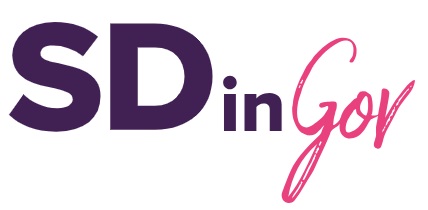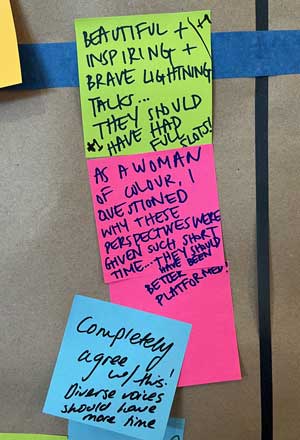 Thank you to everyone who suggested a lightning talk for the 2023 Service Design in Government conference. As usual I learned a huge amount and enjoyed hearing from all the speakers.
Thank you to everyone who suggested a lightning talk for the 2023 Service Design in Government conference. As usual I learned a huge amount and enjoyed hearing from all the speakers.
We had so many proposals that the organisers managed to squeeze in two sessions, on Thursday and on Friday. Even so, I was sad that I had to say ‘no’ to some talks.
In this post, I’ll reflect on the talks we did have and then also think a bit about what might happen for Lightning Talks in the future.
On Thursday, we enjoyed a remarkable variety of talks
The four talks in our first session were notable for being quite different from each other:
- Areeba Siddiqui gave us a heartfelt and inspiring presentation on her journey into product development.
- Natasha Trotman brought her lived experience of neurodivergence and disability to her talk about her cross-sector work on Equalities Design and Anti-Oppressive Co-Production.
- Jaye Hackett challenged us to think about the climate emergency in our design work.
- Laura Dalrymple looked at how we approach decision-making in service design based on her extensive experience of seeing defensive practice in her work as a mental health nurse.
Laura and Jaye published their slides: Lightning Talks session one slides.
That session was videoed so you can watch it below:
Friday’s session was about designing for different generations
Some lovely synchronicity meant that our second Lightning Talks session covered designing for three distinct age groups:
- Sean Peacock started us off with a talk on including children and young people in design.
- Disha Mittal challenged us to think about designing meaningful services for Gen Z – pointing out the sheer variety of people who are a part of that generation.
- Tommy Petillo spoke about the challenges of involving people with Alzheimer’s – the majority of whom are older people – in service design.
You can view slides from Lightning Talks session two here: Lightning Talks session two slides.
We are reflecting on whether to do Lightning Talks in future
 The conference has an open feedback board where people can add their views of the day. We got some lovely feedback, including a worthwhile challenge: “Beautiful + inspiring + brave talks … they should have had full slots”.
The conference has an open feedback board where people can add their views of the day. We got some lovely feedback, including a worthwhile challenge: “Beautiful + inspiring + brave talks … they should have had full slots”.
I’d like to reflect on that, and I’m interested in your views too. Please contact me.
First of all, a bit of history. I curated a lightning talk session at Service Design in Government 2022. I learned a huge amount and enjoyed hearing from all the speakers – and the people who came to the sessions seemed to agree with me. After the first round in 2022, it seemed to me that the shorter format (10 minute talks) and an application process that was a lot quicker and less formal than the main ‘call for speakers’ (for full slots of an hour or more) had worked to encourage speakers from under-represented groups who either did not know about the main ‘call for speakers’ or who had decided not to apply.
So I put in a suggestion to the conference team that I would run the lightning talks again in 2023. They agreed, and I sent out another call in June 2023.
For both years, the idea of the Lightning Talks was to find people who:
- Were going to be at SDinGov anyway
- Felt they had something they really wanted to share but did not want to go through the full application process
- Considered that they are from a group that is underrepresented in conferences focused on service design, user experience, or technology in general.
But as I was putting together the programme over the summer of 2023, item 1 on my list (“going to be at SDinGOV anyway”) was quite a problem. In hindsight, my call for speakers for SDinGOV 2023 wasn’t ideal: I said “Are you already thinking about coming [to the conference]” and that’s not the same as “already have a ticket”.
The conference team offers some ‘opportunity tickets’ to people who would benefit from the conference but who can’t afford to pay for a ticket – but opportunity tickets do not include travel or accommodation. That led to some awkward conversations with people I would have loved to invite but who live too far from Edinburgh to get there.
The conference does offer a conference ticket and help towards travel and accommodation to speakers who are doing a full session, of at least a one hour talk. Competition for these slots is fierce – I’ve been turned down myself many times – and I’m personally not sure how we can convince more people from under-represented groups to apply. I’d like to make it clear that this conference does achieve quite a lot of diversity, especially when compared to some other conferences about technology, but I believe that we can always do more.
As I write this, I’m thinking about whether or not to suggest a Lightning Talks session for 2024. What are your thoughts?
